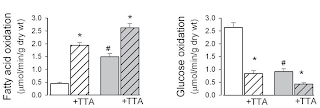An Old Dog Learns New Tricks: "Fatloss Fat" Tetradecylthioacetic Acid (TTA) Cardioprotective in Diabetic Rats
Do you remember the acronym TTA? Tetradecylthioacetic Acid? No. Well, I guess then you were not into fat burners in the early 2000s. TTA, a thia-fatty acid, was all the rage back in the day: Supplement producers claimed it would literally melt fat away and it actually turned out that some users had outstanding results megadosing respective supplements. Others, however, got bloated and/or started cramping. In view of these nasty side effects, most companies decided to reformulate their products and - with the exception of a few so-called "non-thermogenic" fat burners - TTA has almost disappeared from the market.
An international team of scientists from Norway and Canada (Khalid. 2011) has now discovered that the artificial fatty acid tetradecylthioacetic acid, which was originally intended as a drug for the treatment of the metabolic syndrome, might have the potential to protect type II diabetics from heart attacks.
In a previous study (Hafstad. 2009) the scientists had already shown that TTA does increase myocardial fatty acid oxidation in normal mice, a finding that would generally suggest impaired cardiac efficiency and thus be considered detrimental. In the current study on hyperlipidemic [high blood lipid levels] type 2 diabetic mice, however, TTA-treatment (0.5%, 8 days) had almost opposite effects on on cardiac metabolism and function
So, regardless how promising the shift in substrate metabolism from carbohydrates to fats, as it is visualized in figure 1 may appear, if you just want to shed a few pounds of unaesthetic, but healthy subcutaneous body fat, stay away from tetradecylthioacetic acid - for your heart's sake!
An international team of scientists from Norway and Canada (Khalid. 2011) has now discovered that the artificial fatty acid tetradecylthioacetic acid, which was originally intended as a drug for the treatment of the metabolic syndrome, might have the potential to protect type II diabetics from heart attacks.
In a previous study (Hafstad. 2009) the scientists had already shown that TTA does increase myocardial fatty acid oxidation in normal mice, a finding that would generally suggest impaired cardiac efficiency and thus be considered detrimental. In the current study on hyperlipidemic [high blood lipid levels] type 2 diabetic mice, however, TTA-treatment (0.5%, 8 days) had almost opposite effects on on cardiac metabolism and function
We found that TTA treatment increased myocardial FA oxidation, not only in non-diabetic (db/+) mice, but also in diabetic (db/db) mice, despite a clear lipid-lowering effect. While TTA had deleterious effects in hearts from non-diabetic mice (decreased efficiency and impaired mitochondrial respiratory capacity), these effects were not observed in db/db hearts. In db/db hearts TTA improved ischemic tolerance, an effect that is most likely related to TTA's antioxidant property.Being a specifically designed (Pan-)PPAR-ligand [TTA seems to activate all PPAR-receptors] the lipid lowering effect of TTA was to be expected. The differential effect on heart function in healthy and diabetic rats, however, comes as a surprise and reminds us, again, that not all that has been shown to help sick people is beneficial - and sometimes its not even safe! - for the healthy part of the population.
 |
| Figure 1: Myocardial fatty acid and glucose oxidation in hearts of db/+ (white 545 bars) and db/db (gray bars) mice. Results are mean of 8-9 hearts in each group. (Khalid. 2011) |


